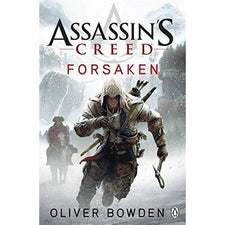
I'm not sure whether this jives with theirĭepiction in Forsaken but I like it. Mortal governments is far less than as usually depicted in the games

Owning several pieces of their technology. Instead, they treat the legends of them as myths despite They're not, apparently, a group with much belief in the power of the On Haytham's goals and the power of the Templars in the early-to-mid 17th century. Really, my favorite part of the book was how it expanded If a decidedly "downer" ending bothers you, this may not be the book for you. This actually increased my enjoyment of the story as not everyone gets to live out their lives in luxury, surrounded by their loved ones, like Altair and Ezio. Oliver Bowden presumably didn't know Edward Kenway would eventually be a protagonist so he has a decidedly atypical ending for a hero. Admittedly, though, readers should be warned it's not the most uplifting of tales. His fate after the events of Black Flag is spelled out, right up until the moment of his death. Haytham Kenway is a decidedly cultured and erudite figure, even as a boy, which contrasts nicely against the occasionally savage actions he's forced to take part in as an agent of the Templars.įor those who are fans of Edward Kenway, the protagonist of Assassin's Creed: Black Flag, this book provides extremely valuable information. The first half of Forsaken is entirely new material, chronicling the life of Haytham Kenway from the time he's eight years old and the child of notorious pirate Edward Kenway to his recruitment into the Templars to a multi-year quest to avenge the death of his loved ones. So, despite the oddball premise, I decided to give Assassin's Creed: Forsaken a try. Assassin's Creed: The Secret Crusade, for example, actually expanded on the story of Altair to the point much of the information within was incorporated into Revelations. I liked Haytham but found him to be overrated when compared to his son.įor those unfamiliar with the Assassin's Creed novelizations, they're actually quite a bit more intricate than just re-tellings of the games themselves. So, I was rather nonplussed to find out the novelization of Assassin's Creed 3 wasn't going to be a chronicle of Connor's adventures but from the perspective of Haytham Kenway. Likewise, I was a huge fan of Connor who I felt to be the most fascinating of the six leads. As much as I loved Ezio, I felt he'd worn out his welcome by Revelations and the cartoonishly evil Borgias were fun to fight but less interesting than the more nuanced antagonists of AC1 and 3.



Of the seven main games in the series, it is my favorite. I was a huge-huge fan of Assassin's Creed 3.


 0 kommentar(er)
0 kommentar(er)
